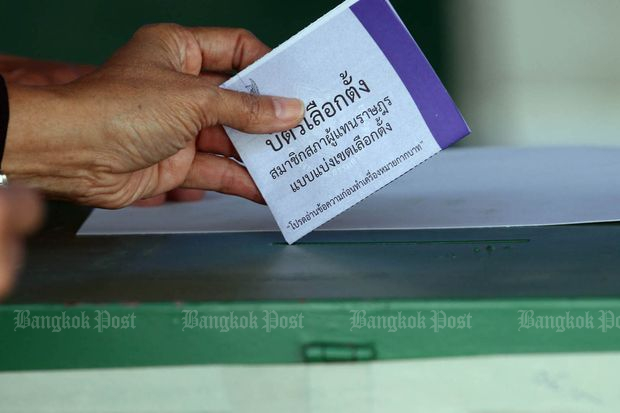
The Election Commission has reaffirmed its stand to set the poll date only after the royal decree takes effect.
“We don’t have any election date model and we’re waiting for the royal decree,” president Ittiporn Boonpracong said at a briefing on Tuesday.
He also dismissed reports that the election will be held on March 10.
The EC is aware of a legal controversy due to conflicting laws, he said. In any case, the EC is confident of being able to announce the poll results within 60 days.
The legal problem led to speculation the Constitutional Court should be asked to interpret it.
On this, Mr Ittiporn admitted it was a solution but a premature one. “If we [EC commissioners] agree on a date [that won’t break both laws], we can proceed.”
He also denied the EC had signalled to the Provincial Administration Department under the Interior Ministry that the election would be delayed.
Mr Ittiporn was responding to reports which showed as evidence a copy of a circular letter from the department to registrars nationwide. The letter, signed on Monday, tells the registrars to put on hold preparations for the poll “because the EC informed us the royal decree on the election has not been published in the Royal Gazette”.
Deputy Prime Minister Wissanu Krea-ngam had said in mid-December the decree on the election was in the process of being submitted to the king, the last step before it is published in the Gazette.
A possible delay of the election, previously planned for Feb 24, was floated last week. Mr Wissanu said with the coronation date set for May 4-6, the EC might need to rethink the poll date so post-election activities won’t overlap with the royal ceremonies taking place 15 days before and after that period. The government suggested March 24 might be more suitable.
But the EC is believed to have limited room for manoeuvre because the election must fall within a window circumscribed by two laws — with provisions that may conflict with each other.
The constitution requires the EC to “complete” the election in 150 days after related organic laws took effect on Dec 11, or by May 9.
The term “complete” could be interpreted as “ballots cast” or “results announced”. The difference between these two activities is 60 days.
Meanwhile, the election law requires it to “hold” the election by May 9 and makes no mention of the announcement of its results.
One way to avoid the potential legal hassle that could nullify the election and land EC commissioners in jail in the future is to ask the Constitutional Court to make a ruling on this now. However, observers have warned going down that road could delay the poll indefinitely if the court takes a long time to make the decision.
Somchai Srisutthiyakorn, a Democrat Party MP candidate, wrote on Facebook on Friday that when he was an EC commissioner, the EC had asked constitution writers led by Meechai Ruchupan, who drafted both the charter and the organic law in question, how to interpret the provisions.
Mr Meechai allegedly told them his job was to write, not interpret, the laws.
The EC moved on to the Council of State and a panel, also led by Mr Meechai, suggested that they ask the Constitutional Court. But again a judge of that court gave a public interview that the court could do nothing about the issue until a problem actually arose.
To avoid these uncertainties, the EC has to set the poll date by March 10 so the results could be announced by May 9 or it can cut down on the time allowed for some activities and shorten its own process so the date could be moved a bit further.
